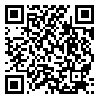Volume 10, Issue 44 (4-2022)
erj 2022, __(44): 111-128 |
Back to browse issues page
Download citation:
BibTeX | RIS | EndNote | Medlars | ProCite | Reference Manager | RefWorks
Send citation to:



BibTeX | RIS | EndNote | Medlars | ProCite | Reference Manager | RefWorks
Send citation to:
Design and validation of Mooc-based learning readiness questionnaire. erj 2022; 10 (44) : 6
URL: http://erj.khu.ac.ir/article-1-973-en.html
URL: http://erj.khu.ac.ir/article-1-973-en.html
Abstract: (6375 Views)
The aim of this study was to design and validate a questionnaire to assess learners' readiness who participate in Mooc courses. The method of this research is in terms of how to collect descriptive information of correlation type (factor analysis) and in terms of applied purposes. The statistical population of this research includes two categories: 1) Specialists and practitioners of E-learning and Mooc in the country.2) 200 people who have awared about Mooc-based course. Data was collected through the means of a Researcher-made questionnaire with reliability (α = 0.95) .In order to verify the validity of this tool two variables content validity coefficients (CVR) and validity index Content (CVI) was used and validated. Quantitative analysis methods such as exploratory and confirmatory factor analysis with the help of SPSS and LISREL software were used to analyze the data. The results of ten factors including: access to technology, technical skills, motivation and attitude to learning, ability to learn through media, self-awareness, self-efficacy, self-direction, social skills, communication and teamwork, critical thinking, self-criticism and constructive criticism, and analysis skills were analyzed in the questionnaire. The results showed that T-values were significant for each indicator with relevant factors with more than 99% confidence. This finding emphasizes that the markers support their agents well. Due to these cases, the necessary evidence was provided to confirm the validity of the items and factors. The fit indices all have a favorable and relatively favorable condition, which indicates the proper fit of the data with the model.
Article number: 6
Type of Study: Research Paper |
Subject:
Educational technology
Received: 2021/03/15 | Revised: 2023/11/21 | Accepted: 2022/09/9 | ePublished: 2022/10/4
Received: 2021/03/15 | Revised: 2023/11/21 | Accepted: 2022/09/9 | ePublished: 2022/10/4
| Rights and permissions | |
 |
This work is licensed under a Creative Commons Attribution-NonCommercial 4.0 International License. |



